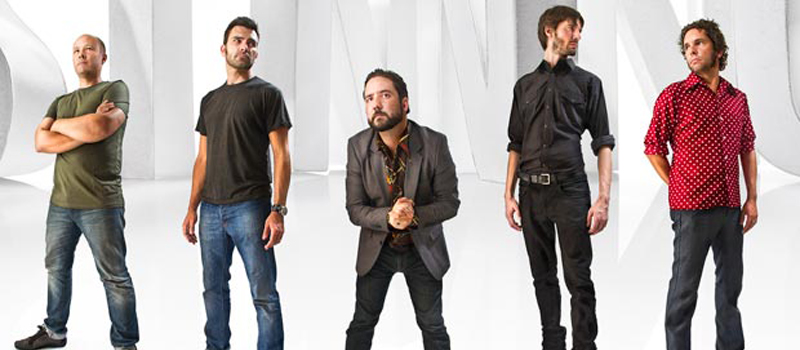Let’s cut through the static. Who are the voices worth listening to in indie rock? Well, push aside the soundbyte-spewing iconoclasts and the photogenic figureheads, the outspoken fanzine addicts and the record store snobs, the image-conscious lo-fi scenesters and the bands playing seedy dives just to score a cover shoot with Magnet. What are you left with? The people who really drive the vehicles that bring indie rock around the globe: the individuals who make sacrifices, both professional and personal, and run independent labels.
While the world is familiar with the Corey Rusks and the Greg Ginns and the Ian McKayes, though – and rightfully so – there are scores of lesser-known label heads doing incredible things by simply doing what they love best. Consider them among the truly unsung heroes of the underground. Case in point: Steve Stone, founder and philosophical guru behind the “anatomically correct” New Jersey indie Vital Cog Records.
Stone, who founded his label in 1997 after managing – among others – the indie pop-rock act Moped, hesitates when asked to describe himself, his history, and his background in independent music. What’s important, it seems, is the product he helps to produce. In six years, Vital Cog has put out close to 30 releases, all of them exhibiting a kind of professionalism and a trademark of innovative design rarely seen in small indies, by bands from Aviso’Hara and Black Sonny to the infamous My Dad Is Dead. Among those releases have been overlooked indie rock gems, as well as rewarding projects like the “Superheroes of Rock” 7″ series and a collaboration with Doug Allen, of “Steven” fame.
In the six years the label has been running out of central New Jersey, however, what are also among the most interesting sounds coming from it are the ruminations from Stone on the ups and downs of producing and peddling independent music.
“The label officially started in February ’97,” remembered Stone, in a recent phone interview.
“I started the label because, after managing a couple of bands and dealing with major labels and seeing what they did to the bands, I decided I could do just as bad a job as they could at putting out records,” he said with a laugh.
The Princeton, N.J. native feels, though, that the disasters of major label marketing and commercialized cultural manipulation, strange as it may sound, are a benefit to the indie rock community in some ways.
“Independent music and bands will live on as long as there’s nothing but crap being put out by major labels,” said Stone. Point, Vital Cog.
Delusions of Adequacy recently got the opportunity to pick Stone’s brain on more than just the disasters of major label-driven music culture, conducting a short question-and-answer session via e-mail.
Delusions of Adequacy: Over the course of Vital Cog’s six years and change, you’ve put out records by a number of indie rock bands. Let’s indulge in the hyphenated-genre game: How do you describe “The Vital Cog Sound” to someone who’s never picked up one of the label’s offerings? Are there bands that, over the years, have epitomized what you see as the label’s sound or are the types of bands you hope to feature in the future?
Steve Stone: I don’t know that there is a conscious effort to have a “defining sound.” I guess part of it is just my particular taste in music. I like guitar-driven, melodic, smart songs that rock. Each band adds its own personality to those qualities. So, no, there isn’t really a particular band that epitomizes the label sound. Maybe when we start putting out hip hop records …
DOA: Are there any indie bands out there now who you would love to work with or cut a record with based on your interests in that particular sound?
SS: There are a few. No. 2 (Neil Gust, formerly of Heatmiser), The Wedding
Present, Freeheat (Jim Reid, formerly of The Jesus & Mary Chain).
DOA: While some indie labels seem to be trapped in the lo-fi black-and-white photocopying rage of decades past, Vital Cog seems to reach for more innovative designs. Do you look at the artwork and design of Vital Cog releases as a defining trait for the label?
SS: Not really, it’s more a matter of style along with substance. If a record looks interesting without knowing what it sounds like, someone is more inclined to give it a chance. I just try to keep things looking as professional as possible given the limited budgets. I also have to give much of the credit to the bands and in particular, Frank Bridges, former bass player for Duochrome. Frank has come up with a lot of the artwork ideas and he is the in-house style master.
DOA: Who’s been behind the label logo shifts? I’ve counted a few over the years you guys have been releasing music.
SS: Ah, yes, the logos. I designed all 3. The first one [a simple gear next to black text] was when I was in my graphic design infancy and it shows. The second one [a uniformed milkman] was just stupid, but the current and final logo design [an updated, 3-D version of the gear] is the one I am most happy with and the one that has been on the most releases.
DOA: Followers of the Vital Cog aesthetic will be treated to a sixth anniversary retrospective in the near future. Tell me about it.
SS: The disc, entitled Dominate The Gears – 6 Years of Vital Cog Records, will include tracks from almost all of our 26 releases, including a rare Moped song that was on a spinART split 7″. The bands on the disc include: Moped, The Diane Linkletter Experience, Aviso’Hara, Duochrome, Sonny Sixkiller, Tim, Ditch Croaker, The Bigger Lovers, Silkworm, John Strohm, My Dad is Dead, Chris Colbourn, Blacksonny, Tizzy and Doug Allen, all in chronological order.
DOA: Sounds like quite the collection. Who could you see putting on a Vital Cog anniversary disc five or ten or twenty years from now?
SS: Good question but I don’t have a good answer. I’ll just be happy if there is a reason to do another anniversary disc.
DOA: You’re fairly outspoken about the work that small labels put into independent releases, without the backing of corporate funds or power structures. If there’s one thing you’ve learned in your six years operating Vital Cog that you wish you knew from Day One, what is it?
SS: Distributors suck. Most of them, anyway.
DOA: Any advice to fledgling indie labels? It seems technology has done quite a bit to allow anyone to put their CD on the market under a label name, but what advice would you give to someone out there looking to really take the plunge and start a small label?
SS: My advice would be to spend your money on something else. Unless you have unlimited funds or an uncle in the business, it’s a tough, thankless task. Just make sure you believe in the bands you’re working with and they put as much effort into it as you do.
DOA: In the Vital Cog split 7″ series, various names in indie rock offered spare tracks and donned outfits that made more than a passing reference to the Marvel Comics of the 1970s. Any plans to continue the series?
SS: We had planned to do a total of 6 split 7″s in our “Super Heroes of Rock” series, but due to the expense and lack of interest in vinyl these days, I’ve decided to stop it at 3. It’s a shame because we had some great bands lined up for the next 3.
DOA: Like who?
SS: We had agreements with Crooked Fingers, No. 2, Freeheat, Cobra Verde,
The Bigger Lovers and The Minders.
DOA: The big question: can quality indie rock really be produced in a place like New Jersey? Though you’re based out of Princeton, a bit of an atypical town in the Garden State, what’s your approach to releasing music by regional/national acts? Has your focus tended to lean toward sounds pouring out of the tri-state area?
SS: The great thing about running a label is it doesn’t matter where you do it as long as the UPS truck can get there and you have a web site. I’ve never even considered making Vital Cog a regional label. We have released records from bands in Kentucky, California, Massachusetts, Alabama and beyond. It doesn’t matter to me where the bands are from. As long as the distributors get the music in stores, college radio plays it and zines review it, people will find out about it. We get orders on our web site from all over the world.
DOA: Do you find people seem to look at you as a “New Jersey” label or do most seem to share the view that zip codes don’t have much to do with the label’s character?
SS: I don’t think most people are very aware of where the label is based. My experience has been that people usually ask where we are after the fact, so I’m pretty sure it’s not an issue.
DOA: Why “Vital Cog?” And, furthermore, what exactly do you mean when you say the label’s been “anatomically correct” since 1997?
SS: Because “Starfucker” was already taken and by “anatomically correct” we mean we have normal sized genitalia, for now at least. Science has come a long way. – Delusions of Adequacy, July 13, 2003




